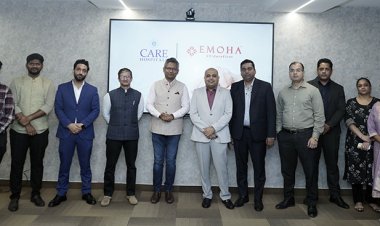Russian-Indian Joint Venture Launches Manufacturing Facility for Electric Trains in Maharashtra
A significant milestone in the collaboration between Russia and India was achieved as a Russian-Indian joint venture officially inaugurated a production facility in Latur, Maharashtra, on Tuesday.

A significant milestone in the collaboration between Russia and India was achieved as a Russian-Indian joint venture officially inaugurated a production facility in Latur, Maharashtra, on Tuesday. This venture, which recently secured a $6.5 billion contract, will be responsible for manufacturing 120 electric trains for Indian Railways.
The joint venture, named Kinet Railway Solutions, is a partnership between Transmashholding, Russia’s largest locomotive and rail equipment manufacturer, and Rail Vikas Nigam Limited (RVNL), an Indian government-owned enterprise. Last year, Kinet Railway Solutions won the highly competitive contract to produce 1,920 train coaches and maintain them for the next 35 years.
Kinet Railway Solutions outbid major global competitors such as Siemens (Germany), Alstom Transport (France), and Stadler Rail (Switzerland) by offering the lowest price of 1.2 billion rupees ($14.61 million) per train. This success underscores the competitive edge of the Russian-Indian partnership in the global railway industry.
Alexandra Meluzova, the project leader from Transmashholding, expressed her enthusiasm for the project in an interview with TASS, stating, "This venture makes a significant contribution to the development of the industry and, most importantly, strengthens the friendship between our countries."
The trains produced by this joint venture will be integral to Indian Railways’ Vande Bharat program, a flagship initiative launched in 2019 aimed at modernizing long-distance travel and enhancing the efficiency of transportation across the country. As of now, around 100 Vande Bharat trains are operational in India, connecting over 280 districts. The most recent three trains under this program were inaugurated by Prime Minister Narendra Modi on August 31. Indian Railways has set an ambitious target to procure 4,500 new Vande Bharat trains by the year 2047.
However, the venture faced a significant challenge last year due to a dispute over the distribution of stakes among the project’s partners. Initially, Metrowagonmash, a subsidiary of Transmashholding, was allotted a 70% stake, while RVNL and Locomotive Electronic Systems (LES), a smaller Russian partner, were to hold 25% and 5% stakes respectively. RVNL later demanded a 69% stake, citing the impact of Western sanctions on Russia and arguing that this shift would facilitate smoother project execution. The disagreement was ultimately resolved through high-level negotiations between the two governments, resulting in Metrowagonmash retaining its majority stake.
The first delivery of the trains manufactured at the Latur facility is scheduled to take place between 2026 and 2030, with the initial two prototypes expected to be ready for testing by the end of 2025, according to Transmashholding.
India, the world’s most populous country, heavily relies on its extensive rail network, with over 12 million people traveling on approximately 14,000 trains each day. Recognizing the critical role of rail transport in the country, the Indian government has increased its railway expenditure by 77% over the past five years, with substantial investments in the construction, modernization, and upgrading of railway lines and rolling stock.






















